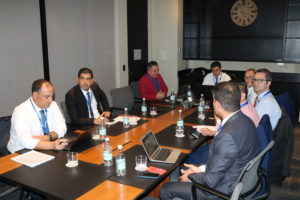What is the ELIPSIA network?
ELIPSIA is the acronym (in Spanish) for the “Europe-Latin America Initiative for the Safety of Children and Adolescents”. It is a network led by Spain that seeks to persecute people who share, download and distribute child pornography in Latin American and European countries. It was created following the demand of the countries that participated in the activity carried out by EL PAcCTO on the “Fight against the Sexual Abuse of Minors”, in the framework of the meeting held with Europol in September 2018 “EMPACT 2019 OAP Drafting meeting” within the EMPACT Cybercrime CSA/CSE.
The ELIPSIA network has the participation of 10 countries in Latin America, 6 countries in Europe, Europol and Interpol. Its main purpose is the exchange of experiences, good practices and knowledge on the subject. It may also be used to informally announce a future request for international judicial assistance.
How does the ELIPSIA network work?
The Civil Guard on behalf of Spain proposed operational action 4.3, the objective of which was to promote collaboration between Europol members and Latin American countries in collaboration with the EL PAcCTO programme.
An agenda of contacts was defined between the Civil Guard of Spain and the countries of the Latin American region, comprising since 2017, with the first activity of EL PAcCTO on cybercrime, and focused specifically on the“Fight against the Sexual Abuse of Minors”, through which they coordinate working methods between the two continents.
Through the QUIJOTE search engine, which is the tool used to detect IPs that exchange paedophile material through the P2P networks Edonkey and Kadmelia and designed by the University of Alcalá for this purpose only, traces are carried out on P2P networks and, the results of which are analysed to detect the main objectives to investigate in each country.
At the time as detecting IPs and having already analysed all the material detected, individualised reports are made by country, by users and objectives and encrypted packets are sent to the countries through a secure channel with specific passwords. This is when the investigations begin in each country, they analyse the material and through the corresponding units they perform a judicial action study to carry out actions such as arrests, entrances into property and house searches, like the ones that took place in Argentina, Brazil, El Salvador, Spain and Uruguay with encouraging results.
What is the I24/7 share network?
Due to the sensitivity of the material, it was necessary to find a secure channel for sending such information. The I24/7 Network is a secure platform for the exchange of police information managed by the Interpol. This platform connects and allows authorised users to exchange vital police information and access the Interpol’s databases and services 24 hours a day. In addition, it is very secure and is the most widespread network worldwide for the exchange of information.
Are there any obstacles that hinder the proper functioning of operations and cooperation between institutions?
Undoubtedly, the rotation of personnel in the police institutions of the Latin American region makes it difficult to organise operations. Therefore, we ask the institutions that are part of the network to commit to the police body or unit, so that the institution becomes the most suitable actor rather than the person designated at any particular moment.
There is much to do. The ELIPSIA network team works to reduce the times of operational activities, so that there is a “deadline” with more defined objectives to be achieved by each of the countries and to achieve greater involvement. A protocol or guide of good practices is needed that includes, among other things, all the networks that operate in each country as well as the procedural tools, and that serves as an example for the creation of a common tracking tool that meets the necessary requirements, increases confidence and can be used in all Latin American countries. It would undoubtedly be good for police and judicial cooperation at all levels in the fight against sexual abuse of minors in the network.
What is the current status of operations?
Currently, more than 30 searches have been carried out, 10 objectives identified, more than 20 people have been arrested and paedophile material and a large number of storage elements and devices have been seized in countries such as Argentina, Brazil, Colombia, Chile, El Salvador, Spain, Mexico and Uruguay.

Meeting of the countries that make up the ELIPSIA network in Chile
The meetings of the members of the network in Santiago de Chile in October allowed the discussion of the problem in their countries, to foresee certain operations among the countries present (Argentina, Bolivia, Brazil, Colombia, Chile, Costa Rica, Uruguay), in cooperation with Europol and Interpol with the participation of European countries (Spain and Portugal) and define the basis for the perpetuation of said network.
During the meetings, theInterpol’s support in the exchange of information and at the operational level was reiterated, supporting the initiatives created and international actions promoted by EL PAcCTO and the ELIPSIA network.
Police models, internal organisation needs, resources and work procedures, as well as communication with internal organs and the centralisation/decentralisation of information and actions of the units were discussed.


Among the crimes currently committed by the network, the distribution of child pornography is one of the most widespread and common in many countries, being a problem of special interest due to the characteristics of the victims.
Cybercrime encompasses a wide range of crimes committed through the network. The fact that child pornography was chosen as a crime to investigate has facilitated the participation of countries and the involvement in this operational activity. Cybercrime has been postulated as one of the priorities that most worries States today, among other things, because it is a criminal area which is still unknown. If cybercrime itself raises general interest, in particular child pornography increases such interest because of the sensitivity of the subject and the vulnerability of the victims, this creates common bonds of interest.
Cybercrime is one of thecross-cutting action elementsof EL PAcCTO. By its very nature, it encompasses numerous criminal modalities, which imply different investigation techniques. Because of their complexity, they are crimes that generate special police and judicial interest, highlighting, among other things, the production and dissemination of sexual abuse content to minors, through extensive criminal networks.
EL PAcCTO works to facilitate the ratification of international agreements on the subject, improving internal regulations on the definition of criminal offences and generating dynamics of inter-institutional work against cybercrime. Therefore, seeking to promote the specialisation of public ministry units in the investigation of related and complex crimes.
